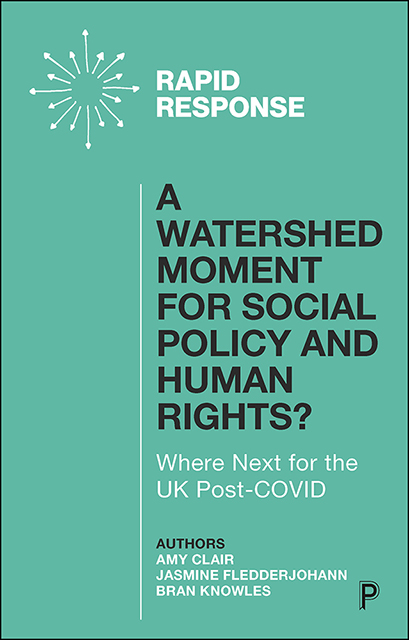4 - The right to housing
Published online by Cambridge University Press: 21 April 2023
Summary
As with medical care and food, housing is one of the key rights included in Article 25 of the UDHR. It is central to ensuring a decent standard of living and a prerequisite for many other rights. Despite its centrality in human rights, the role of housing in the welfare state is often portrayed as ‘wobbly’. It was one of the Five Giant Evils in the Beveridge Report, but is arguably the area of the welfare state to have been most significantly undermined by neoliberal decision making.
Even before the COVID-19 pandemic the housing crisis in the UK, and many other nations, was starkly evident. Characterised particularly by concerns about high housing costs, the inaccessibility of owner-occupation, and the conditions faced by those excluded from ownership, the housing crisis meant that housing was on ‘the political agenda’ (Colenutt, 2020) to a far greater extent than in much of recent history.
However, as Madden and Marcuse (2016) point out, crises are typically framed as temporary, whereas the challenges of the housing market for low income and marginalised groups are longstanding (Illner, 2020). The recurrence of the language of crisis instead reflects the creeping expansion of housing difficulties into middle-class lives. The COVID pandemic has accelerated and intensified concerns about a ‘housing crisis’, as well as emphasising the importance of housing to people's lives.
Housing policy and the right to housing
CESCR General Comment 4 (UN Economic and Social Council, 1991) expands on the right to housing established in the UDHR. Most importantly, it equates to the right to live with ‘security, peace and dignity … irrespective of income or access to economic resources’ (UN Economic and Social Council, 1991). This approach to housing rights is consistent with the need for a home, rather than simply physical shelter. A safe and secure home is a fundamental need (Maslow, 1943), essential for social participation (Madden and Marcuse, 2016), to access employment and services (for example Prescott, 2021), for health and well-being (Shaw, 2004), and a multitude of other essentials. Although parsing out the specific aspects of housing which are essential is complex, General Comment 4 (UN Economic and Social Council, 1991) lists the following:
1. Legal security of tenure
2. Availability of services, materials, facilities and infrastructure
3. Affordability
4. Habitability
5. Accessibility
6. Location
7. Cultural adequacy (including ‘modern technical facilities’)
- Type
- Chapter
- Information
- A Watershed Moment for Social Policy and Human Rights?Where Next for the UK Post-COVID, pp. 57 - 74Publisher: Bristol University PressFirst published in: 2023



